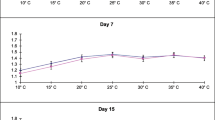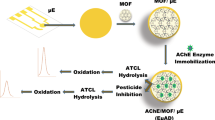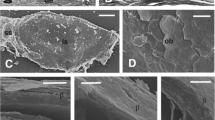Abstract
A CONVENIENT source of the enzyme acetylcholinesterase occurs in the electric organ of the electric eel, and preparations of a high degree of purity have been obtained from it1. Because of the high activity of these preparations and the sensitive methods available for the estimation of enzymatic activity, appreciable dilutions of the enzyme must often be made. It has been found that dilution causes a rapid loss of enzymatic activity, and the addition of an inert protective protein such as gelatine has been recommended1. Further studies2 have revealed that low ionic strengths also produce inactivation and that protection is afforded by plasma albumen3.
This is a preview of subscription content, access via your institution
Access options
Subscribe to this journal
Receive 51 print issues and online access
$199.00 per year
only $3.90 per issue
Buy this article
- Purchase on Springer Link
- Instant access to full article PDF
Prices may be subject to local taxes which are calculated during checkout
Similar content being viewed by others
References
Rothenberg, M. A., and Nachmansohn, D., J. Biol. Chem., 168, 223 (1947).
Goldstein, A., and Doherty, M. E., Archiv Biochem. Biophys., 33, 22 (1951).
Fleisher, J. H., Spear, S., and Pope, E. J., Anal. Chem., 27, 1080 (1955).
Author information
Authors and Affiliations
Rights and permissions
About this article
Cite this article
SCAIFE, J. Stability of Cholinesterase of the Electric Eel. Nature 183, 541–542 (1959). https://doi.org/10.1038/183541a0
Issue Date:
DOI: https://doi.org/10.1038/183541a0
Comments
By submitting a comment you agree to abide by our Terms and Community Guidelines. If you find something abusive or that does not comply with our terms or guidelines please flag it as inappropriate.



